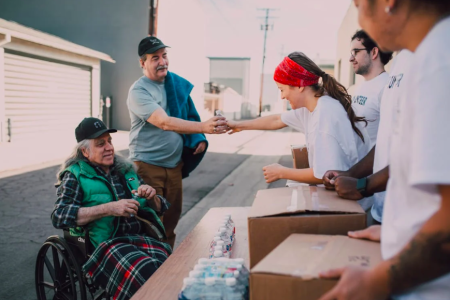Medicaid rollbacks could quietly affect your housing and food support—what to know
- Replies 0
For millions of Americans—especially those over 60—Medicaid is more than health insurance.
It’s a lifeline.
In recent years, this crucial program has quietly expanded to cover things like housing support, transportation, and even access to fresh food.
But now, a major policy reversal under the Trump administration could put those vital services at risk.
Traditionally, Medicaid paid for things like hospital stays, prescriptions, and doctor appointments. But in recent years, a bold shift took place: states began using Medicaid to fund "social determinants of health"—non-medical needs that directly affect your well-being.
Here’s what that looked like:

Ironically, it was during Trump’s first term that some of these innovations began. North Carolina was the first state to receive permission to use Medicaid this way, and since then, at least 24 states have followed.
But in 2025, the Trump administration has announced it’s pulling back. Officials argue Medicaid should focus only on core medical services, and that housing, food, and internet should be handled by other government agencies.
In a March memo, the Centers for Medicare & Medicaid Services (CMS) rescinded the Biden-era guidance that allowed for wide-ranging social services under Medicaid.
Going forward, states must get separate approval for each new benefit—and many fear those approvals will be denied or delayed.
Also read: Millions may lose Medicaid—see which states are most affected
In California, the CalAIM program has invested $12 billion to help Medicaid recipients with housing, case management, and nutrition.
In just two years, over half a million referrals have been made—but that’s still a small slice of the state’s 15 million enrollees.
Eric Jones, a 65-year-old in Los Angeles, credits the program with saving his life:
“When I got diabetes, I didn't know what to do and I had a hard time getting to my medical appointments. My case manager got me rides to my appointments and also helped me get into an apartment.”
In Oregon, Medicaid recipients can get everything from home-delivered meals to rental support, air filters, and generators—vital in the face of extreme weather and power outages.
In North Carolina, early data showed the state saved $1,020 per participant per year, thanks to fewer ER visits and hospital stays.
Health experts say the rollback is shortsighted. According to research, only 15% of health outcomes are driven by medical care.
The rest? Housing, food, and social support.
Dr. Margot Kushel, a San Francisco physician and homelessness expert, warns:
“It will just lead to more death, more suffering, and higher health care costs.”
Meanwhile, states that have invested billions are now in limbo, unsure if their Medicaid programs will be renewed or shut down early.
Also read: Trump’s recent Medicaid comments leave seniors with questions
The Trump administration argues that other agencies—like Housing and Urban Development and Agriculture—should handle housing and food. But those very agencies are also facing proposed cuts, leaving no clear safety net for those who lose Medicaid-funded support.
And while some Republicans are calling for Medicaid to return to “basic health care,” states like California and North Carolina insist the broader model is working—and saving taxpayer money.
“We believe wholeheartedly that housing is health, food is health, so seeing these programs disappear would be devastating,” said Kelly Bruno-Nelson of CalOptima Health in Orange County.
Medicaid’s expansion into social services has quietly helped hundreds of thousands live healthier, more stable lives. But now, those gains are under threat.
With states caught in a political crossfire, it’s more important than ever to stay informed, speak up, and support one another.
Because health care isn’t just about treating illness—it’s about preventing suffering.
Read next: Taxpayers stand to save $30 billion with Medicaid reform

Have you benefited from Medicaid-funded housing, nutrition, or transportation? Are you worried about the future of these services? Do you think Medicaid should cover more than just doctor visits? Drop your thoughts in the comments. Your voice could help shape the future of healthcare in America.
It’s a lifeline.
In recent years, this crucial program has quietly expanded to cover things like housing support, transportation, and even access to fresh food.
But now, a major policy reversal under the Trump administration could put those vital services at risk.
Traditionally, Medicaid paid for things like hospital stays, prescriptions, and doctor appointments. But in recent years, a bold shift took place: states began using Medicaid to fund "social determinants of health"—non-medical needs that directly affect your well-being.
Here’s what that looked like:
- Security deposits and first month’s rent
- Home-delivered meals and grocery prescriptions
- Air conditioners and mini-fridges for people with chronic conditions
- Transportation to medical appointments
- Wheelchair ramps and other home modifications

Medicaid rollbacks could quietly affect your housing and food support. Image Source: RDNE Stock project / Pexels
Ironically, it was during Trump’s first term that some of these innovations began. North Carolina was the first state to receive permission to use Medicaid this way, and since then, at least 24 states have followed.
But in 2025, the Trump administration has announced it’s pulling back. Officials argue Medicaid should focus only on core medical services, and that housing, food, and internet should be handled by other government agencies.
In a March memo, the Centers for Medicare & Medicaid Services (CMS) rescinded the Biden-era guidance that allowed for wide-ranging social services under Medicaid.
Going forward, states must get separate approval for each new benefit—and many fear those approvals will be denied or delayed.
Also read: Millions may lose Medicaid—see which states are most affected
In California, the CalAIM program has invested $12 billion to help Medicaid recipients with housing, case management, and nutrition.
In just two years, over half a million referrals have been made—but that’s still a small slice of the state’s 15 million enrollees.
Eric Jones, a 65-year-old in Los Angeles, credits the program with saving his life:
“When I got diabetes, I didn't know what to do and I had a hard time getting to my medical appointments. My case manager got me rides to my appointments and also helped me get into an apartment.”
In Oregon, Medicaid recipients can get everything from home-delivered meals to rental support, air filters, and generators—vital in the face of extreme weather and power outages.
In North Carolina, early data showed the state saved $1,020 per participant per year, thanks to fewer ER visits and hospital stays.
Health experts say the rollback is shortsighted. According to research, only 15% of health outcomes are driven by medical care.
The rest? Housing, food, and social support.
Dr. Margot Kushel, a San Francisco physician and homelessness expert, warns:
“It will just lead to more death, more suffering, and higher health care costs.”
Meanwhile, states that have invested billions are now in limbo, unsure if their Medicaid programs will be renewed or shut down early.
Also read: Trump’s recent Medicaid comments leave seniors with questions
The Trump administration argues that other agencies—like Housing and Urban Development and Agriculture—should handle housing and food. But those very agencies are also facing proposed cuts, leaving no clear safety net for those who lose Medicaid-funded support.
And while some Republicans are calling for Medicaid to return to “basic health care,” states like California and North Carolina insist the broader model is working—and saving taxpayer money.
“We believe wholeheartedly that housing is health, food is health, so seeing these programs disappear would be devastating,” said Kelly Bruno-Nelson of CalOptima Health in Orange County.
Medicaid’s expansion into social services has quietly helped hundreds of thousands live healthier, more stable lives. But now, those gains are under threat.
With states caught in a political crossfire, it’s more important than ever to stay informed, speak up, and support one another.
Because health care isn’t just about treating illness—it’s about preventing suffering.
Read next: Taxpayers stand to save $30 billion with Medicaid reform
Key Takeaways
- The Trump administration is pulling back Medicaid’s ability to fund social services like housing and food, arguing it should focus solely on medical care.
- States like California, Oregon, and North Carolina have invested billions in programs that show early signs of reducing ER visits and improving health.
- Critics warn the rollback will raise costs, increase suffering, and harm the elderly and disabled who rely on these services.
- Medicaid beneficiaries are urged to stay informed, advocate for their needs, and explore alternate support programs.






